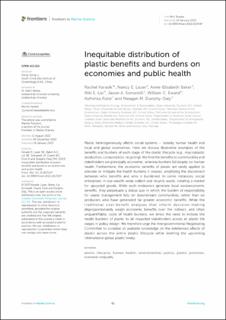| dc.contributor.author | Karasik, Rachel | |
| dc.contributor.author | Lauer, Nancy E. | |
| dc.contributor.author | Baker, Anne-Elisabeth | |
| dc.contributor.author | Lisi, Niki E. | |
| dc.contributor.author | Somarelli, Jason A. | |
| dc.contributor.author | Eward, William C. | |
| dc.contributor.author | Fürst, Kathinka | |
| dc.contributor.author | Dunphy-Daly, Meagan M. | |
| dc.date.accessioned | 2023-11-22T09:33:34Z | |
| dc.date.available | 2023-11-22T09:33:34Z | |
| dc.date.created | 2023-11-21T10:24:23Z | |
| dc.date.issued | 2023 | |
| dc.identifier.citation | Frontiers in Marine Science. 2023, 9:1017247. | en_US |
| dc.identifier.issn | 2296-7745 | |
| dc.identifier.uri | https://hdl.handle.net/11250/3104035 | |
| dc.description.abstract | Plastic heterogeneously affects social systems – notably human health and local and global economies. Here we discuss illustrative examples of the benefits and burdens of each stage of the plastic lifecycle (e.g., macroplastic production, consumption, recycling). We find the benefits to communities and stakeholders are principally economic, whereas burdens fall largely on human health. Furthermore, the economic benefits of plastic are rarely applied to alleviate or mitigate the health burdens it creates, amplifying the disconnect between who benefits and who is burdened. In some instances, social enterprises in low-wealth areas collect and recycle waste, creating a market for upcycled goods. While such endeavors generate local socioeconomic benefits, they perpetuate a status quo in which the burden of responsibility for waste management falls on downstream communities, rather than on producers who have generated far greater economic benefits. While the traditional cost-benefit analyses that inform decision-making disproportionately weigh economic benefits over the indirect, and often unquantifiable, costs of health burdens, we stress the need to include the health burdens of plastic to all impacted stakeholders across all plastic life stages in policy design. We therefore urge the Intergovernmental Negotiating Committee to consider all available knowledge on the deleterious effects of plastic across the entire plastic lifecycle while drafting the upcoming international global plastic treaty. | en_US |
| dc.language.iso | eng | en_US |
| dc.publisher | Frontiers | en_US |
| dc.rights | Navngivelse 4.0 Internasjonal | * |
| dc.rights.uri | http://creativecommons.org/licenses/by/4.0/deed.no | * |
| dc.title | Inequitable distribution of plastic benefits and burdens on economies and public health | en_US |
| dc.type | Peer reviewed | en_US |
| dc.type | Journal article | en_US |
| dc.description.version | publishedVersion | en_US |
| dc.rights.holder | © 2023 The Authors | en_US |
| dc.source.pagenumber | 11 | en_US |
| dc.source.volume | 9 | en_US |
| dc.source.journal | Frontiers in Marine Science | en_US |
| dc.identifier.doi | 10.3389/fmars.2022.1017247 | |
| dc.identifier.cristin | 2199366 | |
| dc.source.articlenumber | 1017247 | en_US |
| cristin.ispublished | true | |
| cristin.fulltext | original | |
| cristin.qualitycode | 1 | |

